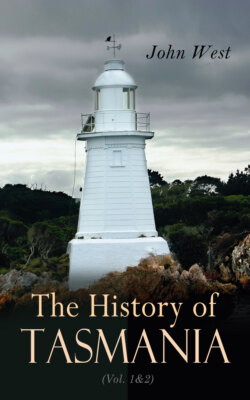Читать книгу The History of Tasmania (Vol. 1&2) - John West - Страница 16
На сайте Литреса книга снята с продажи.
FOOTNOTES:
Оглавление[77] 14 Geo. iii. c. 83.
[78] "Whereas it may be found necessary that a colony and a civil government should be established, and that a court of criminal jurisdiction should also be established, with authority to proceed in a more summary way than is used within this realm, according to the known and established laws thereof." The court, described as above, is then authorised, to try "outrages and misbehaviours, as if committed in this realm would be treason or misprision thereof, felony or misdemeanour."—27 Geo. iii. Nothing is said of legislative power.
[79] Collins, vol. i. p. 32.
[80] Bigge's Jud. Report, p. 34.
[81] Holt has left a graphic picture of a justice, which must be received, perhaps, with some reservation;—"I was walking with Barrington, the most accomplished pickpocket: he was arm-in-arm with Richard Atkins, Esq. I wished to have some conversation with them. A bottle of rum was produced, and some pleasant conversation about Ireland passed. At length I wished to retire, and Mr. A. said he never allowed any bottle off his table till he saw it emptied. We finished the half gallon bottle, and of course were not a little elevated. Mr. A. acted as a kind of deputy, when Judge Dore was not able, which not unfrequently happened: when spirits were plenty in the colony, he was generally indisposed." Mr. Croker adds, that "Atkins was appointed as a substitute to Collins in 1796, by the secretary of state, until the arrival of Mr. Dore in 1797."
[82] Bigge's Jud. Report, p. 2.
At Norfolk Island a court of criminal jurisdiction departed still further from the precedents of civil justice. An act authorised the government to convene a court of four military or naval officers, to decide on questions of life and death, even when free men were implicated.
[83] "Yesterday, the bench assembled, when a free man, formerly belonging to Fort Dalrymple, was found guilty of stealing a silver watch from George Guest, jun., his property, and sentenced to labor for the government for the term of five years, and moreover to receive 500 lashes."—Derwent Star, Feb. 6th, 1810.
[84] Holt's Memoirs, vol. ii. p. 202.
[85] Such punishments were not always unmerited, but they were capricious. A magistrate tied a carter to the wheel of his waggon, and inflicted 300 lashes for cruelty to his bullocks; but Dr. Montgarret ordered the blacksmith to be flogged, for presenting his bill!
[86] Mann's Picture of New South Wales, 1811.
[87] Bentham's Plea.
[88] Bigge's Jud. Report, p. 17.
[89] Ibid.
[90] Bigge's Jud. Report, p. 6. Wentworth, p. 43. edit. of 1820.
[91] Bigge's Report, p. 48.
[92] Macarthur's New South Wales: its present state and future prospects, 1837.
[93] Bigge's Report.
[94] 59 Geo. iii. 1819.
[95] "This sentence was put in execution before the provision store, when the mob, either to display their aversion to the crime, or what might be more probable, to catch anything that wore the form of amusement, pelted him with rotten eggs and dirt."—Collins, vol. ii. p. 54.
[96] Gazette, 1823.
[97] Maconochie, in his supplement to Australiana, extracts the following passages from one of Sir James Mackintosh's private letters, published in his Memoirs, p. 342–3:—"Even out of England there are many places which I should prefer to this (Bombay). You will smile at the mention of Botany Bay; but I am most serious, and I assure you that next to a parliamentary situation, to which either nature or early ambition has constantly directed my views, I should prefer, without much regarding pecuniary advantages, that of being the lawgiver of Botany Bay. … England, in rearing such a community, is preparing not only conquerors of India, but enemies to herself and to all mankind. While on the one side the experiment of a reforming penal colony is, perhaps, the grandest ever tried in morals, it is one which is perfectly safe; for the settlement never can be worse than it is now, when no attempt towards reformation is dreamed of, and when it is governed on principles of political economy more barbarous than those which prevailed under Queen Bess. Every day the difficulties of the experiment grow with the increase of the (criminal) population. … I have heard, read, and thought so much about this extraordinary colony, that I am very confident in my general opinions; and I confess, between ourselves, that I am a piece of an enthusiast in my reforming projects," &c.
[98] 43 Geo. iii.
[99] "Not a governor, not a magistrate, that has acted thus, but has exposed himself to prosecutions upon prosecutions, to actions upon actions, from which not even the crown can save him."—Bentham's Plea for the Constitution, 1804.
[100] Wentworth, p. 389. 1820.
[101] Collins, vol. ii. p. 214.
[102] Collins, vol. i. p. 268.
[103] Bigge's Jud. Report, p. 76.
[104] Collins.
[105] Bigge's Jud. Report.
[106] Ibid.
[107] Ibid.
